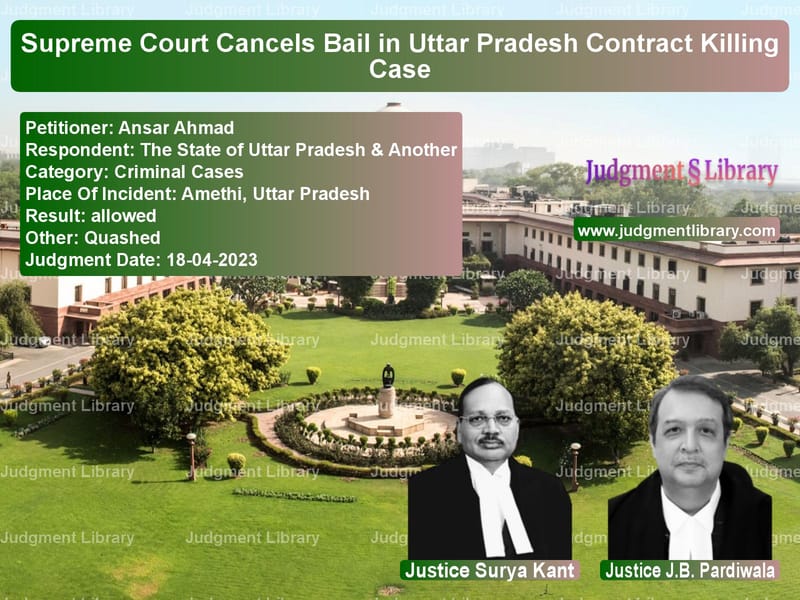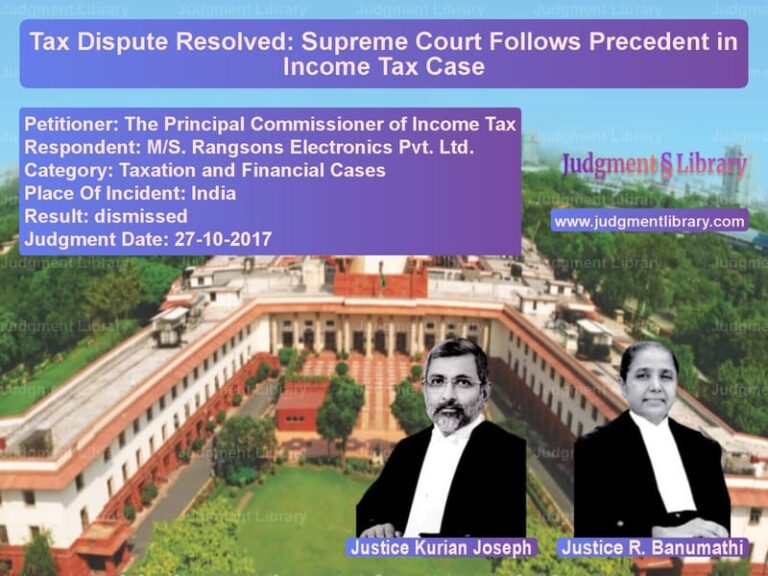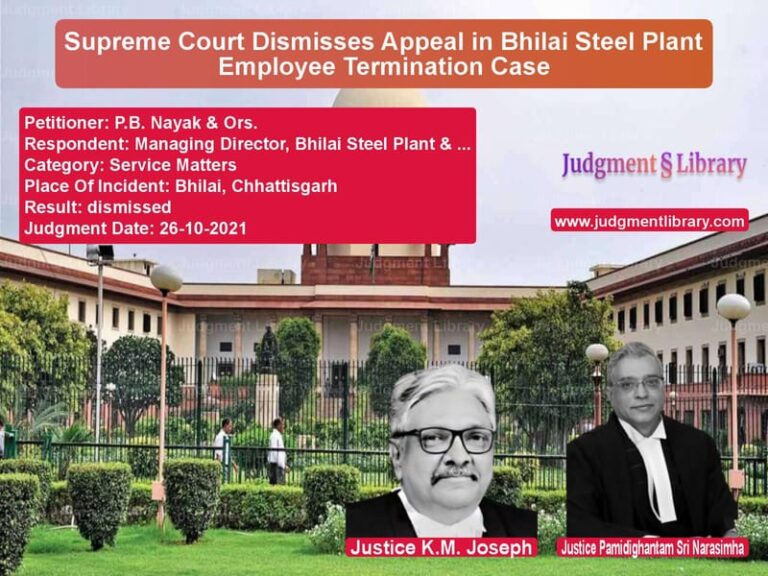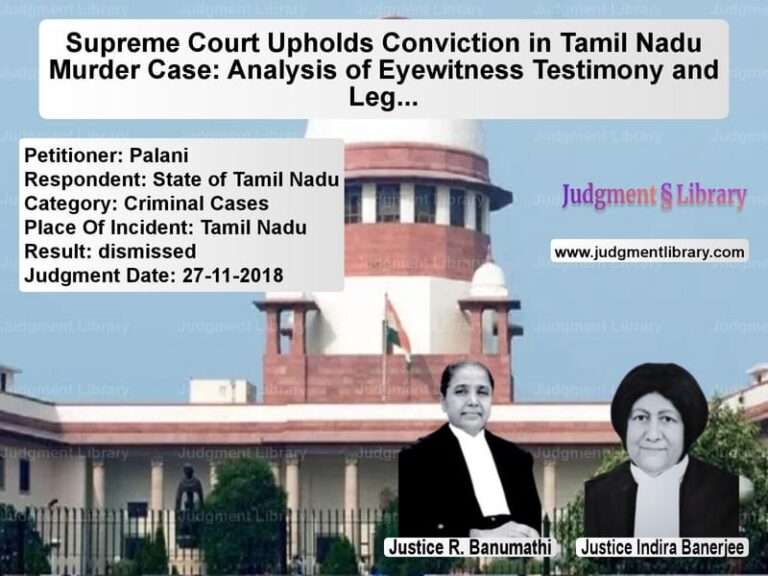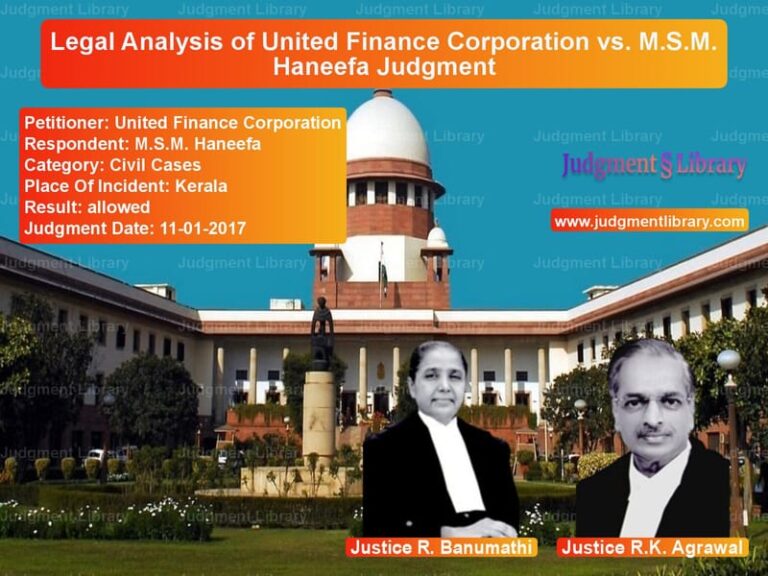Supreme Court Cancels Bail in Uttar Pradesh Contract Killing Case
The case of Ansar Ahmad vs. The State of Uttar Pradesh & Another is a significant ruling concerning bail jurisprudence in criminal cases involving contract killings. The Supreme Court set aside the bail granted to two accused in the murder of Ashfaque Ahmad, emphasizing the importance of judicial scrutiny in cases involving serious offenses. The Court held that granting bail without considering material evidence and the criminal antecedents of the accused was erroneous.
Background of the Case
The case arose from an incident that took place in Amethi, Uttar Pradesh, where Ashfaque Ahmad was murdered in broad daylight in front of the Jagdishpur Branch of Vijaya Bank. The prosecution alleged that the accused, Subhash Yadav and Rajesh Vikram Singh, conspired and hired contract killers to execute the crime. A grenade attack was followed by indiscriminate firing, resulting in the instant death of Ashfaque Ahmad and injuries to Razi Ahmad @ Manu. The incident was reportedly linked to an old enmity involving a previous murder case in which Rajesh Vikram Singh had been convicted.
The case was registered under Sections 147, 148, 149, 307, 302, and 120-B/34 of the Indian Penal Code along with Sections 3/4 of the Explosive Substances Act.
Legal Issues Before the Court
- Whether the High Court erred in granting bail to the accused despite their criminal antecedents.
- Whether granting bail in a contract killing case without considering witness protection and judicial precedents was justified.
- Whether the accused misused their bail by attempting to delay the trial.
Arguments by the Petitioner (Ansar Ahmad – Complainant)
The petitioner, father of the deceased, challenged the bail granted by the Allahabad High Court, arguing:
- “The accused have a long history of criminal activities, with Subhash Yadav having 14 cases and Rajesh Vikram Singh having 26 cases against them.”
- “The accused were previously convicted under Section 302 IPC, and while on bail, they orchestrated this murder.”
- “The accused were absconding after being granted bail, delaying the trial.”
- “The murder was a contract killing with political overtones, requiring witness protection.”
Arguments by the Respondents (Accused – Subhash Yadav & Rajesh Vikram Singh)
The accused defended their bail, contending:
- “Bail once granted should not be canceled unless there is evidence of its misuse.”
- “All previous cases against them were politically motivated.”
- “No direct evidence links them to the crime, and they were falsely implicated.”
- “The trial court can impose restrictions instead of canceling bail.”
Supreme Court’s Analysis and Judgment
After reviewing the case, the Supreme Court made the following key observations:
- “The murder took place in broad daylight and was a planned contract killing.”
- “The accused have a history of serious criminal cases, making them a threat to the judicial process.”
- “The High Court failed to consider the accused’s criminal antecedents and their ability to influence witnesses.”
- “Since the trial had been stalled due to the accused’s absence, bail was misused.”
The Supreme Court ruled:
“The respondents are directed to surrender before the Trial Court forthwith, failing which coercive action shall be taken against them.”
Key Takeaways from the Judgment
- Courts must consider the criminal history of the accused while granting bail in serious cases.
- Bail in contract killing cases must account for witness protection.
- Misuse of bail by absconding or delaying trial can lead to cancellation.
- Judicial discretion in bail matters must align with established legal principles.
Impact of the Judgment
This ruling reinforces the principle that bail should not be granted in a casual manner when the accused have a serious criminal history. The Court emphasized that granting bail in cases involving contract killings should be done with extreme caution to prevent witness intimidation and obstruction of justice.
Read also: https://judgmentlibrary.com/supreme-court-acquits-two-men-in-karnataka-murder-case-after-24-years/
By canceling the bail and directing the accused to surrender, the Supreme Court has reaffirmed the importance of ensuring a fair trial and protecting the legal process from being undermined by influential criminals.
Petitioner Name: Ansar Ahmad.Respondent Name: The State of Uttar Pradesh & Another.Judgment By: Justice Surya Kant, Justice J.B. Pardiwala.Place Of Incident: Amethi, Uttar Pradesh.Judgment Date: 18-04-2023.
Don’t miss out on the full details! Download the complete judgment in PDF format below and gain valuable insights instantly!
Download Judgment: ansar-ahmad-vs-the-state-of-uttar-p-supreme-court-of-india-judgment-dated-18-04-2023.pdf
Directly Download Judgment: Directly download this Judgment
See all petitions in Murder Cases
See all petitions in Bail and Anticipatory Bail
See all petitions in Extortion and Blackmail
See all petitions in Attempt to Murder Cases
See all petitions in Custodial Deaths and Police Misconduct
See all petitions in Judgment by Surya Kant
See all petitions in Judgment by J.B. Pardiwala
See all petitions in allowed
See all petitions in Quashed
See all petitions in supreme court of India judgments April 2023
See all petitions in 2023 judgments
See all posts in Criminal Cases Category
See all allowed petitions in Criminal Cases Category
See all Dismissed petitions in Criminal Cases Category
See all partially allowed petitions in Criminal Cases Category

